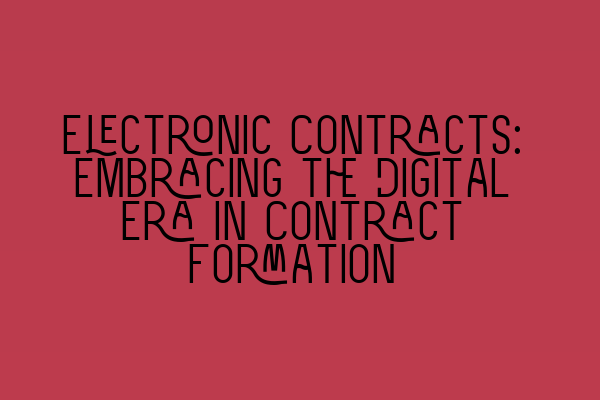### Electronic Contracts: Embracing the Digital Era in Contract Formation
In today’s fast-paced digital world, businesses are constantly seeking innovative ways to streamline their processes and improve efficiency. One area that has seen significant advancement is contract formation. Gone are the days of paper-based agreements and lengthy back-and-forth negotiations. The advent of electronic contracts has revolutionized the way contracts are created, signed, and executed, offering numerous benefits to businesses of all sizes.
**1. The Rise of Electronic Contracts**
Electronic contracts, also known as e-contracts, refer to any contract that is formed, signed, and stored electronically. With the widespread adoption of technology, the use of electronic contracts has gained significant traction across industries. From simple agreements between individuals to complex commercial contracts between businesses, electronic contracts have become the preferred method of contracting due to their convenience, speed, and cost-effectiveness.
**2. Key Advantages of Electronic Contracts**
2.1 *Efficiency and Convenience:*
Electronic contracts eliminate the need for physical paperwork, which can be time-consuming and prone to errors. By leveraging digital platforms and tools, businesses can create, negotiate, and finalize contracts with just a few clicks. This streamlined process saves valuable time and allows for greater efficiency in contract management.
2.2 *Cost Savings:*
Traditional paper-based contracts involve various expenses such as printing, postage, and storage. By transitioning to electronic contracts, businesses can significantly reduce these costs. Electronic contracts also minimize the need for physical storage space, enabling businesses to save on office space and associated expenses.
2.3 *Faster Contract Execution:*
One of the most significant advantages of electronic contracts is the speed at which they can be executed. With electronic signatures, parties can sign contracts swiftly, regardless of their physical location. This eliminates the time-consuming process of mailing documents back and forth and expedites the overall contract formation process.
2.4 *Enhanced Security:*
Electronic contracts offer robust security features that protect against unauthorized access and tampering. Digital encryption and authentication protocols provide a secure environment for storing and transmitting contracts. This ensures the integrity and confidentiality of the contract’s content, minimizing the risk of fraudulent activities.
**3. Legal Validity of Electronic Contracts**
The legal framework surrounding electronic contracts varies from jurisdiction to jurisdiction. However, many countries, including the United Kingdom, have enacted legislation that recognizes the validity and enforceability of electronic contracts. In the UK, the Electronic Communications Act 2000 and the Electronic Signatures Regulations 2002 provide the legal basis for electronic contracts.
To ensure the enforceability of electronic contracts, it is essential to comply with certain requirements. These include:
3.1 *Consent:*
All parties involved must agree to contract formation through electronic means. This can be established through explicit consent or conduct that indicates acceptance of electronic communication.
3.2 *Secure Electronic Signatures:*
Electronic signatures serve as a substitute for traditional handwritten signatures. To be legally valid, electronic signatures must be unique to the signatory, capable of identifying the signatory, and linked to the electronic contract.
For a comprehensive understanding of the legal requirements and implications of electronic contracts, it is advisable to seek professional legal advice.
**4. Embracing the Future of Contract Formation**
As we move further into the digital era, the use of electronic contracts is poised to become even more prevalent. By embracing this technology, businesses can experience increased efficiency, cost savings, and reduced administrative burden. Furthermore, electronic contracts pave the way for greater collaboration and remote working opportunities.
However, it is crucial to stay updated on evolving legislation and best practices related to electronic contracts. FQPS, an industry-leading provider of legal education and training, offers comprehensive SQE preparation courses that cover essential topics like contract law. Their SQE 2 preparation courses provide in-depth knowledge of various legal subjects, including contract formation.
To excel in the Solicitors Qualifying Examination (SQE) and gain expertise in contract law, practicing through SQE 1 practice exams and practice mocks such as FLK1 and FLK2 can be highly beneficial. These resources simulate real exam conditions and help candidates assess their knowledge and readiness for the actual exam.
For more information on SQE exam dates and to explore the range of SQE preparation courses offered by FQPS, visit their website [here](https://fqps.co.uk/sqe/sqe2-preparation).
In conclusion, electronic contracts offer numerous advantages for businesses seeking efficient, convenient, and cost-effective contract formation methods. By embracing this digital era, businesses can revolutionize their contract management processes and position themselves for success in the ever-evolving business landscape. Stay informed, stay prepared, and embrace the future with electronic contracts.
**Related Articles:**
– [SQE 1 Practice Exam Questions](https://fqps.co.uk/sqe/sqe1-preparation/mcq-practice-quiz)
– [SQE 1 Practice Mocks FLK1 FLK2](https://fqps.co.uk/sqe/sqe1-preparation/practice-mocks-quiz)
– [SQE 2 Preparation Courses](https://fqps.co.uk/sqe/sqe2-preparation)
– [SQE 1 Preparation Courses](https://fqps.co.uk/sqe/sqe1-preparation)
– [SRA SQE Exam Dates](https://fqps.co.uk/sqe/sqe1-sqe2-exam-dates)
